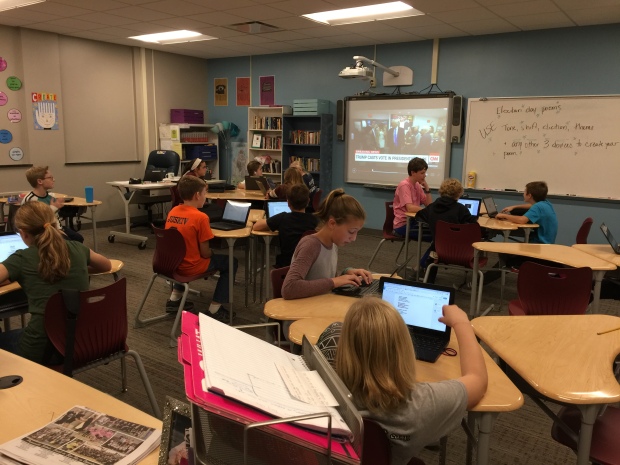On Tuesday, November 8, I did what I do every day. I came into my room and typed out the essential question of the day for students, and set up for writer’s workshop on our most recent writing project because that is what I had carefully planned for the day.
And then my sophomores walked in.
“Mrs. K, this election is going to be crazy,” one commented. “Can we watch the news? I want to see what they’re saying.”
Lately, I’ve been focusing on really listening to what my students want and need. I used to ask them for written feedback multiple times a year, and I felt that that was helpful. I would immediately share the things I thought we could make happen (more group time or more independent projects) and explain carefully why certain requests were non-negotiable (their requests to eliminate writing were always equal parts hilarious, maddening, and saddening for me, but that’s a post for another day). But that feedback wasn’t instant; often I had already missed lots of opportunities to provide them with better lessons.
So when all of my students echoed that request, we went with it. I logged into my cable account and put the news on my SMARTBoard. Then, we had to decide how we would measure our learning.
We are in our poetry unit, and at the beginning of the unit, kids activated background knowledge about poetry by completing a project, and most students came to the conclusion that poetry is about using emotion to convey a message. This campaign had certainly evoked some emotion from Americans, and so poetry seemed to be a good fit.
“Write a poem about it,” I said. For the next five minutes, we had lots of blank screens. Students weren’t sure where to start. None of the prewriting activities in our toolbox felt like a good fit.
I knew that the kids were struggling to understand how diction creates a strong tone in poetry, though, and I also knew that the media is well-versed in word choice, so I modeled. “Okay, let’s all listen for a minute and write down any words we hear that stand out to us.” Pencils scratched and keyboards clacked away. Soon I had a list of seven or eight words, and I separated them into groups. The kids seemed to understand what I was doing. I was organizing my words so that the shift in my poem might be created more authentically through diction.
So we watched, listened, and wrote.

Kids were not just engaged, they were empowered to share their thoughts and opinions. They asked so many questions of me and of each other. It was energizing, and they didn’t struggle to include figurative language and other literary devices. It came naturally for them. They crafted their writing purposefully, which is what I strive to teach them to do every day.
They posted their finished poems in the window of our room and they raced to do it! Here they were, anxious to publish and share their poems with their schoolmates. Throughout the day, students brought their friends by the window to read poems; their learning spilled out of our classroom.
Perhaps the best thing that happened that day was that students discussed some controversial topics with emotion but also with empathy. 7th graders, freshmen, and sophomores felt comfortable sharing their opinions and using respectful discourse more than most adults I’ve witnessed in the last few months. They didn’t avoid the tough topics — they just understood that their opinions and experiences mattered as much as anyone else’s.
I continue to be amazed at what can happen for my students when I trust them. They want to learn, and I believe that’s true of even the most seemingly apathetic students. When they are the experts of themselves, why wouldn’t we ask them what motivates them? I’m learning that they often know better than I do.
This exemplifies what education should be. Students should have opportunities to respond, think critically about, and create based on authentic texts, in this case, the news. Ditching your lesson plan was a brave act that led to a multifaceted and meaningful learning experience. The idea of having them write poems was brilliant!
LikeLiked by 1 person
Thank you so much! I appreciate your feedback!
LikeLiked by 1 person